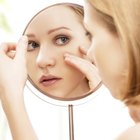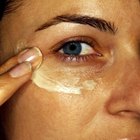
Shea butter and coconut oil are two ingredients that are common in natural skincare products. While they are both excellent emollients and moisturizers, each has its own distinct benefits owing to antioxidants and other healing compounds. While it's widely maintained that both Shea butter and coconut oil also act as sunscreens, they only provide minimal added protection. Therefore, only use them alongside, not in place of, your everyday sunscreen.
Shea Butter
Shea butter, derived from the nuts of the Karite tree, contains fatty oils that provide intense moisturizing capability. It is rich in vitamins C and E which help to neutralize sun damage, and has been known to have anti-inflammatory properties that help treat topical skin conditions such as dermatitis.
Coconut Oil
The fatty acids in coconut oil work as a reinforcing barrier on the skin, sealing moisture in for intense, long-lasting hydration. It also contains high quantities of lauric acid, which can be used to treat viral, fungal and bacterial skin conditions like warts, athletes foot or acne. Coconut oil is often an ingredient in creams and lotions but can also be found in body scrubs and soaps.
Related Articles

List of Retinoids

How to Repair Open Pores

What Are the Ingredients in Proactiv?

Jojoba Oil Benefits

Skin Care Products That Contain ...

How to Remove the Smell of Cologne From ...

How to Heal an Inflamed Bikini Area

How to Treat Doc Martens With Mink Oil

The Best Facial Moisturizer That Won't ...

The Best Facial Moisturizers for People ...

Can Tri-Luma Be Used to Fade Acne Scars?

How to Clean Lizard Skin Boots

How to Prevent Pock Holes From ...

Can Age Spots Be Reversed?

How to Make a Spray Tan Last

What Foods Provide Calcium D-Glucarate?

Are There Ways to Get Rid of Blocked ...

Review of New-Skin Scar Therapy

How to Use Copper Peptide With Vitamin C

Oil of Olay & Wrinkles
References
Resources
Writer Bio
Aiden Summer is a creative production consultant for artists, architects and designers.
Photo Credits
David De Lossy/Photodisc/Getty Images